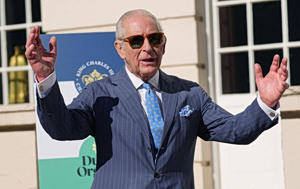With the world a more dangerous place than when President-elect Donald Trump first took office, current and former advisers expect he will navigate widening conflicts by building deterrence against foreign rivals while favoring transactional policies with U.S. allies.
The U.S. hasn’t been feared enough overseas during the Biden administration, according to these advisers. By showcasing American economic and military might, the second Trump presidency should bring peace or, at minimum, prevent further escalation in Ukraine, the Middle East and beyond, they said.
“It’s going to be a return to peace through strength. Deterrence is going to be restored,” said Trump’s former national security adviser Robert O’Brien , who could play a senior role in the incoming administration. “American adversaries understand that the things they’ve gotten away with over the last four years will not be tolerated any further.”
Executing such policies is easier said than done, especially with Russia, Iran and North Korea coalescing into an informal military alliance that has the economic and diplomatic backing of a rapidly rearming China.
When Trump tried and failed in 2019 to negotiate a nuclear deal with North Korean leader Kim Jong Un in Hanoi, the problem of the Korean Peninsula could be tackled in relative isolation. That is no longer the case in many of the world’s toughest hot spots, a former Trump White House official said.
“With North Korean soldiers serving with the Russians to kill Ukrainians using Iranian missiles, who are selling their oil to the Chinese, just the interconnectedness of all of these different policy areas is something we didn’t have,” the former official said. “We could have a discrete North Korea policy. We could have a discrete Iran policy. Now it’s got to be done much more holistically.”
Unlike Biden, who hasn’t spoken to Russian President Vladimir Putin since February 2022, Trump has signaled that he is aiming to negotiate a settlement of the war in Ukraine with Putin. Such personal diplomacy might be helpful in weakening the new anti-American axis, said retired Lt. Gen. Keith Kellogg , who served in top national-security positions in the Trump administration.
“It all starts with personal relationships,” said Kellogg, who wasn’t speaking on behalf of the campaign but is being considered for a senior job in the new administration. “A President Trump will reach out to key leaders to try and find a way to work through a problem. You always have stronger options available, like sanctions or brute force, but it is not the option of first choice.”
America’s alliances are likely to come under new strain, if Trump raises trade tariffs on European and Asian allies, as he said in his presidential campaign. He has frequently complained that countries such as Germany, which runs a huge trade surplus with the U.S. while enjoying its military protection, are taking advantage of American largess.
“I don’t think Trump has a plan to destroy alliances, but he also doesn’t really care about them,” said Jeremy Shapiro , director of the U.S. program at the European Council on Foreign Relations. “He thinks they are rip-offs for the American public, and that allies are like relatives who come to your house to borrow money and then stay all day and use your pool.”
Bracing for a new U.S. relationship, French President Emmanuel Macron warned Thursday about “naive trans-atlanticism,” in an address to European leaders gathered in Budapest. Trump “has been elected by the American people, and he will defend American interests, which is a legitimate and good thing,” Macron said. “The question is whether we are ready to defend the interests of Europeans. This is the only question.”
During Trump’s first term, his team initially struggled to persuade Europeans to replace equipment from state-owned Chinese telecommunications suppliers such as Huawei, fearing their potential for espionage. Trump’s trade war against Europe made some leaders less willing to work with Washington.
If European governments feel the new Trump administration threatens their security by accommodating Russia over Ukraine, American allies might be tempted to improve ties with China, the world’s other great power, even if it means breaking ranks with Washington.
Hard line
The U.S.-China relationship is likely to dominate Trump’s second term. He is expected to double down on his hard-line approach, which the Biden administration by and large continued, former and current advisers said. Trump might return to the trade war that marked his first administration and invest more in U.S. military preparedness for a possible conflict in the Pacific.
The president-elect is more wary of Chinese leader Xi Jinping , whom he blames for the Covid-19 pandemic and, because of its disastrous consequences, his loss to Biden in 2020, two former Trump administration officials said. Trump also was angered by Chinese attempts to hack his 2024 campaign.
Trump won’t have the same willingness to take Xi at face value, one of the former officials said.
Sen. Chris Coons (D-Del.) warned that any Trump mishandling of relations with European allies could prove a geopolitical boon for Beijing. “The Chinese have been waiting for it and preparing for it, and we are better off challenging China’s technological advances and intended dominance in partnership with our allies,” he said.
Shrinking American military commitments overseas was a goal in Trump’s first administration. Current conflicts in Europe and the Middle East don’t involve U.S. troops directly, but that doesn’t mean Trump will stay on the sidelines. Instead, former and current advisers said, the incoming commander in chief will likely try to involve himself diplomatically, potentially more than Biden did.
“He wants to insert the U.S. into every conflict in the world to meditate, to bring about diplomatic solutions,” the former Trump White House official said. “That’s going to be a major centerpiece for what he does, being kind of a broker for peace all over the world.”
Even lower-level disputes stir Trump’s penchant to place himself at the center of negotiations. One former White House official recalled arriving at work one day during the first administration and hearing Trump talk about mediating the longstanding—and politically far afield—dispute between Ethiopia and Egypt over the Grand Ethiopian Renaissance Dam on the Nile.
Trump’s key asset is his unpredictability, unlike Biden who often telegraphed his actions in advance, according to supporters and even some of his critics. In a January 2022 gaffe, Biden said that Western allies wouldn’t have a unified response if Putin carried out a “minor incursion” into Ukraine—remarks that Trump’s supporters say encouraged the full-scale invasion just over a month later.
With Trump, rival leaders can’t be certain how far America would go in reacting to their moves, allies say.
“Deterrence requires clearly communicating threats to your adversaries, and Trump did that, love it or hate it,” said Matthew Kroenig , vice president of the Scowcroft Center for Strategy and Security at the Atlantic Council. He served as a senior adviser at the Pentagon in the first Trump administration.
Heavy price
Trump has made clear that he wants to end the war in Ukraine, though he hasn’t said how. His advisers suggest freezing the war in place, confirming Russia’s de facto seizure of about 20% of Ukraine, and coercing Kyiv to abandon for decades its quest for membership in the North Atlantic Treaty Organization.
Putin, however, is interested in taking a much larger chunk of Ukraine, as well as gaining control over the future government in Kyiv, which Trump might find unpalatable.
Trump “is going to do what it takes to bring the war to an end and the killing to an end,” O’Brien said. “How he goes about that diplomatically, we will see how that plays out. But the president has been very clear that the killing should stop.”
Trump was determined to be tougher with Iran than Biden, reviving sanctions enforcement and returning to the “maximum pressure” campaign of his last administration, especially if Tehran edges closer to obtaining nuclear weapons, advisers said.
Then on Friday, the Justice Department disclosed that the Federal Bureau of Investigation had foiled an Iranian plot to assassinate Trump before the election. In August, U.S. prosecutors charged a Pakistani man with ties to Iran in a plot to kill Trump.
Trump remains willing to talk with Iran, one of the former Trump administration officials said, but Tehran is going to pay a very heavy price at the negotiating table. “Maybe you shouldn’t have tried to kill him,” the former official said.
Neither Trump nor his running mate, JD Vance, want war with Tehran, people close to the president-elect said. But that doesn’t mean he would stand by if Iran decided to build nuclear weapons, the people said.
Trump has long campaigned against what he called endless wars, and he might finally withdraw U.S. troops from Syria and Iraq, where they have repeatedly come under attack from Iranian proxy groups.
“We don’t know yet what it will be, but Trump’s approach will be much, much stronger, and that should be no surprise to anybody,” said Andrew Tabler , a senior fellow at the Washington Institute for Near East Policy who served in Trump’s White House. “He’s likely to use diplomacy, sanctions, as well as a credible threat of military force to try and affect an outcome.”
Trump will likely seek to include Saudi Arabia in the Abraham Accords, a series of bilateral agreements his administration negotiated between Israel and four Arab nations, former and current advisers said. He failed to accomplish that in his first administration.
Unlike the Biden administration, which dissuaded Israel from striking Iran’s nuclear sites and energy export facilities, Trump had told Israeli Prime Minister Benjamin Netanyahu to “do what you have to do,” regarding Iran and its proxies.
Netanyahu isn’t likely to have unlimited U.S. backing to pursue military operations in Gaza and Lebanon, given the devastating toll on Palestinian and Lebanese civilians. Trump had a falling-out with Netanyahu over the Israeli prime minister’s refusal to challenge the legitimacy of Biden’s victory in 2020. Though the two men patched up ties this year, Trump’s resentment remains, according to current and former advisers.
Trump successfully campaigned to attract Muslim and Arab voters appalled by the carnage in Gaza, defeating Vice President Kamala Harris in heavily Arab-American towns, such as Dearborn, Mich. Unlike Biden, Trump would pay a limited political price in Congress for strong-arming Netanyahu to wind down the war, if he chooses to do so.
Write to Yaroslav Trofimov at yaroslav.trofimov@wsj.com , Lara Seligman at lara.seligman@wsj.com and Alexander Ward at alex.ward@wsj.com


